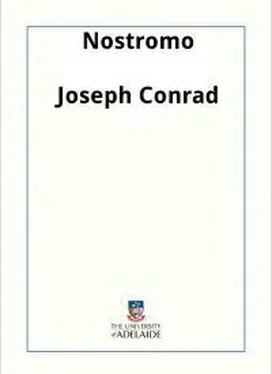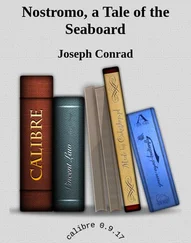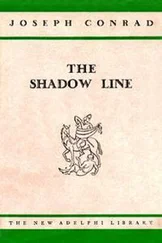Джозеф Конрад - Nostromo - A Tale of the Seaboard
Здесь есть возможность читать онлайн «Джозеф Конрад - Nostromo - A Tale of the Seaboard» весь текст электронной книги совершенно бесплатно (целиком полную версию без сокращений). В некоторых случаях можно слушать аудио, скачать через торрент в формате fb2 и присутствует краткое содержание. Год выпуска: 2006, Жанр: Классическая проза, на английском языке. Описание произведения, (предисловие) а так же отзывы посетителей доступны на портале библиотеки ЛибКат.
- Название:Nostromo: A Tale of the Seaboard
- Автор:
- Жанр:
- Год:2006
- ISBN:нет данных
- Рейтинг книги:4 / 5. Голосов: 1
-
Избранное:Добавить в избранное
- Отзывы:
-
Ваша оценка:
- 80
- 1
- 2
- 3
- 4
- 5
Nostromo: A Tale of the Seaboard: краткое содержание, описание и аннотация
Предлагаем к чтению аннотацию, описание, краткое содержание или предисловие (зависит от того, что написал сам автор книги «Nostromo: A Tale of the Seaboard»). Если вы не нашли необходимую информацию о книге — напишите в комментариях, мы постараемся отыскать её.
Nostromo: A Tale of the Seaboard — читать онлайн бесплатно полную книгу (весь текст) целиком
Ниже представлен текст книги, разбитый по страницам. Система сохранения места последней прочитанной страницы, позволяет с удобством читать онлайн бесплатно книгу «Nostromo: A Tale of the Seaboard», без необходимости каждый раз заново искать на чём Вы остановились. Поставьте закладку, и сможете в любой момент перейти на страницу, на которой закончили чтение.
Интервал:
Закладка:
“Ah, if we had left it alone, Charley!”
“No,” Charles Gould said, moodily; “it was impossible to leave it alone.”
“Perhaps it was impossible,” Mrs. Gould admitted, slowly. Her lips quivered a little, but she smiled with an air of dainty bravado. “We have disturbed a good many snakes in that Paradise, Charley, haven’t we?”
“Yes, I remember,” said Charles Gould, “it was Don Pepe who called the gorge the Paradise of snakes. No doubt we have disturbed a great many. But remember, my dear, that it is not now as it was when you made that sketch.” He waved his hand towards the small water-colour hanging alone upon the great bare wall. “It is no longer a Paradise of snakes. We have brought mankind into it, and we cannot turn our backs upon them to go and begin a new life elsewhere.”
He confronted his wife with a firm, concentrated gaze, which Mrs. Gould returned with a brave assumption of fearlessness before she went out, closing the door gently after her.
In contrast with the white glaring room the dimly lit corredor had a restful mysteriousness of a forest glade, suggested by the stems and the leaves of the plants ranged along the balustrade of the open side. In the streaks of light falling through the open doors of the reception-rooms, the blossoms, white and red and pale lilac, came out vivid with the brilliance of flowers in a stream of sunshine; and Mrs. Gould, passing on, had the vividness of a figure seen in the clear patches of sun that chequer the gloom of open glades in the woods. The stones in the rings upon her hand pressed to her forehead glittered in the lamplight abreast of the door of the sala.
“Who’s there?” she asked, in a startled voice. “Is that you, Basilio?” She looked in, and saw Martin Decoud walking about, with an air of having lost something, amongst the chairs and tables.
“Antonia has forgotten her fan in here,” said Decoud, with a strange air of distraction; “so I entered to see.”
But, even as he said this, he had obviously given up his search, and walked straight towards Mrs. Gould, who looked at him with doubtful surprise.
“Senora,” he began, in a low voice.
“What is it, Don Martin?” asked Mrs. Gould. And then she added, with a slight laugh, “I am so nervous to-day,” as if to explain the eagerness of the question.
“Nothing immediately dangerous,” said Decoud, who now could not conceal his agitation. “Pray don’t distress yourself. No, really, you must not distress yourself.”
Mrs. Gould, with her candid eyes very wide open, her lips composed into a smile, was steadying herself with a little bejewelled hand against the side of the door.
“Perhaps you don’t know how alarming you are, appearing like this unexpectedly—”
“I! Alarming!” he protested, sincerely vexed and surprised. “I assure you that I am not in the least alarmed myself. A fan is lost; well, it will be found again. But I don’t think it is here. It is a fan I am looking for. I cannot understand how Antonia could—Well! Have you found it, amigo?”
“No, senor,” said behind Mrs. Gould the soft voice of Basilio, the head servant of the Casa. “I don’t think the senorita could have left it in this house at all.”
“Go and look for it in the patio again. Go now, my friend; look for it on the steps, under the gate; examine every flagstone; search for it till I come down again. . . . That fellow”—he addressed himself in English to Mrs. Gould—“is always stealing up behind one’s back on his bare feet. I set him to look for that fan directly I came in to justify my reappearance, my sudden return.”
He paused and Mrs. Gould said, amiably, “You are always welcome.” She paused for a second, too. “But I am waiting to learn the cause of your return.”
Decoud affected suddenly the utmost nonchalance.
“I can’t bear to be spied upon. Oh, the cause? Yes, there is a cause; there is something else that is lost besides Antonia’s favourite fan. As I was walking home after seeing Don Jose and Antonia to their house, the Capataz de Cargadores, riding down the street, spoke to me.”
“Has anything happened to the Violas?” inquired Mrs. Gould.
“The Violas? You mean the old Garibaldino who keeps the hotel where the engineers live? Nothing happened there. The Capataz said nothing of them; he only told me that the telegraphist of the Cable Company was walking on the Plaza, bareheaded, looking out for me. There is news from the interior, Mrs. Gould. I should rather say rumours of news.”
“Good news?” said Mrs. Gould in a low voice.
“Worthless, I should think. But if I must define them, I would say bad. They are to the effect that a two days’ battle had been fought near Sta. Marta, and that the Ribierists are defeated. It must have happened a few days ago—perhaps a week. The rumour has just reached Cayta, and the man in charge of the cable station there has telegraphed the news to his colleague here. We might just as well have kept Barrios in Sulaco.”
“What’s to be done now?” murmured Mrs. Gould.
“Nothing. He’s at sea with the troops. He will get to Cayta in a couple of days’ time and learn the news there. What he will do then, who can say? Hold Cayta? Offer his submission to Montero? Disband his army—this last most likely, and go himself in one of the O.S.N. Company’s steamers, north or south—to Valparaiso or to San Francisco, no matter where. Our Barrios has a great practice in exiles and repatriations, which mark the points in the political game.”
Decoud, exchanging a steady stare with Mrs. Gould, added, tentatively, as it were, “And yet, if we had could have been done.”
“Montero victorious, completely victorious!” Mrs. Gould breathed out in a tone of unbelief.
“A canard, probably. That sort of bird is hatched in great numbers in such times as these. And even if it were true? Well, let us put things at their worst, let us say it is true.”
“Then everything is lost,” said Mrs. Gould, with the calmness of despair.
Suddenly she seemed to divine, she seemed to see Decoud’s tremendous excitement under its cloak of studied carelessness. It was, indeed, becoming visible in his audacious and watchful stare, in the curve, half-reckless, half-contemptuous, of his lips. And a French phrase came upon them as if, for this Costaguanero of the Boulevard, that had been the only forcible language—
“ Non, Madame. Rien n’est perdu .”
It electrified Mrs. Gould out of her benumbed attitude, and she said, vivaciously—
“What would you think of doing?”
But already there was something of mockery in Decoud’s suppressed excitement.
“What would you expect a true Costaguanero to do? Another revolution, of course. On my word of honour, Mrs. Gould, I believe I am a true hijo del pays , a true son of the country, whatever Father Corbelan may say. And I’m not so much of an unbeliever as not to have faith in my own ideas, in my own remedies, in my own desires.”
“Yes,” said Mrs. Gould, doubtfully.
“You don’t seem convinced,” Decoud went on again in French. “Say, then, in my passions.”
Mrs. Gould received this addition unflinchingly. To understand it thoroughly she did not require to hear his muttered assurance—
“There is nothing I would not do for the sake of Antonia. There is nothing I am not prepared to undertake. There is no risk I am not ready to run.”
Decoud seemed to find a fresh audacity in this voicing of his thoughts. “You would not believe me if I were to say that it is the love of the country which—”
She made a sort of discouraged protest with her arm, as if to express that she had given up expecting that motive from any one.
“A Sulaco revolution,” Decoud pursued in a forcible undertone. “The Great Cause may be served here, on the very spot of its inception, in the place of its birth, Mrs. Gould.”
Читать дальшеИнтервал:
Закладка:
Похожие книги на «Nostromo: A Tale of the Seaboard»
Представляем Вашему вниманию похожие книги на «Nostromo: A Tale of the Seaboard» списком для выбора. Мы отобрали схожую по названию и смыслу литературу в надежде предоставить читателям больше вариантов отыскать новые, интересные, ещё непрочитанные произведения.
Обсуждение, отзывы о книге «Nostromo: A Tale of the Seaboard» и просто собственные мнения читателей. Оставьте ваши комментарии, напишите, что Вы думаете о произведении, его смысле или главных героях. Укажите что конкретно понравилось, а что нет, и почему Вы так считаете.












